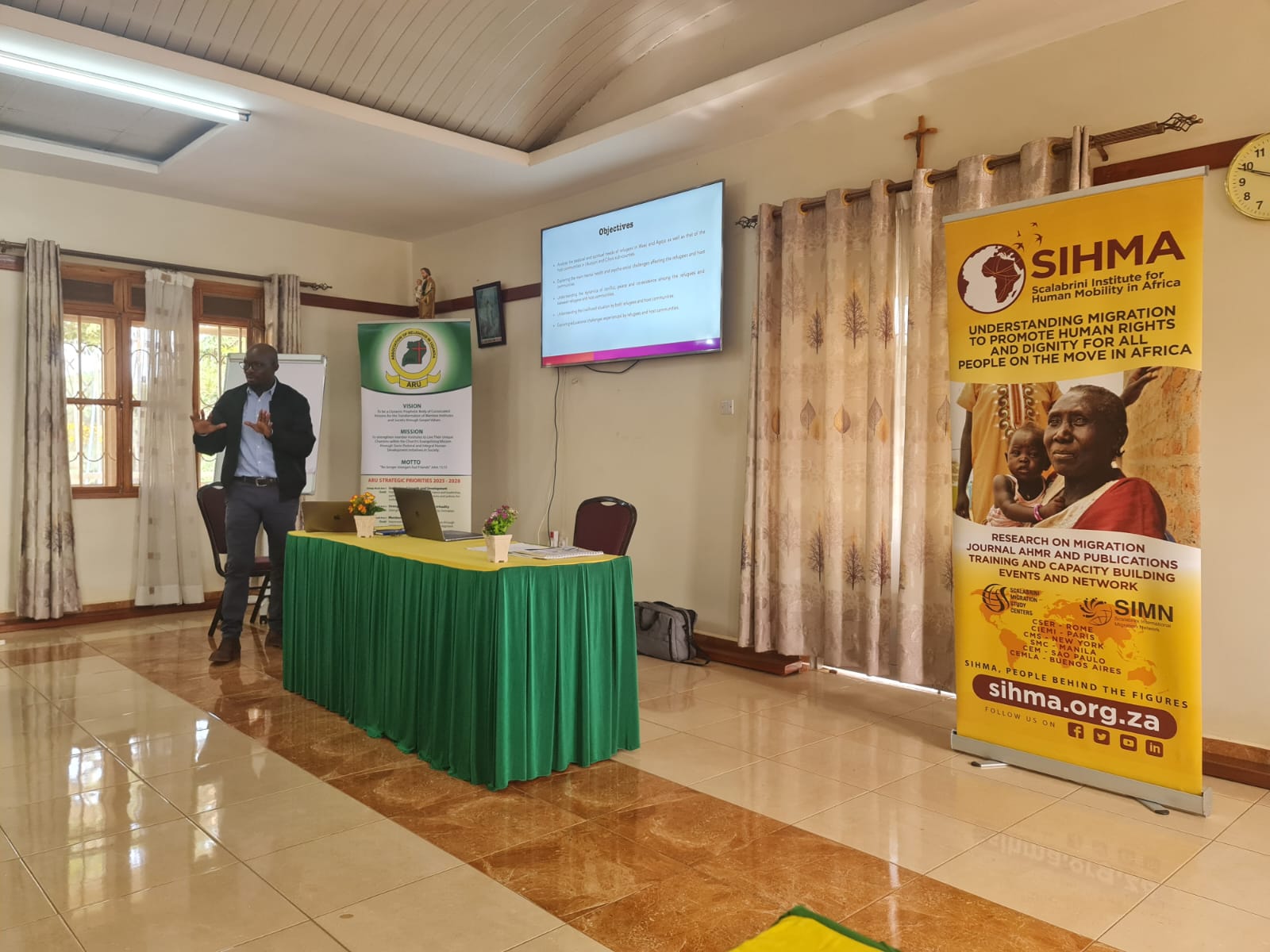
Key Performance Indicator Framework Research Workshop in Uganda: A Collaborative Approach to Refugee Integration
The Key Performance Indicator (KPI) Framework Research Workshop, held from 15th to 16th July 2025 at the ARUA Centre in Kampala, Uganda, brought together stakeholders to discuss refugee integration through research, collaboration, and practical solutions. The workshop aimed to share experiences, present research findings, gather stakeholder feedback, and develop actionable recommendations for implementing a robust KPI framework.
Day 1: Setting the Stage for Refugee Integration
The workshop began with an introduction by Fr. Filippo Ferraro, who framed the discussions within the broader context of supporting displaced populations. He highlighted the Scalabrini network’s role in advocating for multi-stakeholder collaboration and emphasized how research informs effective interventions. The session also outlined the workshop’s expected outcomes, setting a clear direction for the discussions ahead.
Following the introduction, Br. R. Mwansa presented findings from a Needs Assessment conducted by the Society of Missionaries of Africa, Missionary Sisters of Our Lady of Africa, and the Ukusijoni Refugee Service. The assessment provided critical insights into the challenges faced by refugees in Adjumani, identified gaps in service provision, and suggested practical interventions. One notable initiative discussed was the Agro-Smart project, a tangible outcome of the research that supports refugee livelihoods through agricultural innovation.
The next session, led by Dr. Nakabo and Dr. Chinyakata, introduced the KPI research project, detailing its methodology and findings. They presented a proposed KPI framework designed to measure refugee integration, explaining how the indicators were developed and the facilitators for successful implementation. Stakeholders then engaged in group discussions, providing feedback on the proposed KPIs. The day concluded with a plenary session, where participants shared their insights on refining the framework.
Key Takeaways from Day 1
The discussions underscored the need for targeted interventions to enhance refugee integration. Key points included the importance of skilling programs, market linkages, and educational support to prevent dropouts. Challenges such as refugee resistance to integration, policy-implementation gaps, and funding discrepancies were also highlighted. Additionally, participants stressed the need for stronger advocacy on naturalisation and citizenship, as well as better strategies for managing refugee movements and labour market access.
Day 2: Refining the KPI Framework and Planning for Implementation
The second day began with reflections on the previous discussions, followed by a presentation of the revised KPI framework incorporating stakeholder feedback. Rachel led this session, allowing participants to critically assess the indicators and suggest further refinements based on contextual realities. The collaborative approach ensured that the final KPIs would be both practical and adaptable to different organizational needs.
Fr. Filippo then facilitated a session on recommendations for implementation and Monitoring & Evaluation (M&E). Participants proposed actionable steps, including mapping stakeholders, sharing the KPI framework with relevant organizations, and integrating it into existing refugee support programs. The importance of dissemination through working group meetings and targeted partner engagements was also emphasized.
The session on M&E provided a theoretical and practical foundation for tracking progress. Fr. Filippo stressed the need for continuous joint monitoring to ensure that findings inform program improvements. The discussions reinforced the idea that collaboration among organizations is essential for effective implementation.
Key Takeaways from Day 2
Participants agreed that the KPI framework could serve as a guiding tool for organizations working with refugees. They also recognized the value of aligning indicators with existing frameworks used by different stakeholders. The discussions reinforced the importance of partnerships in ensuring the successful adoption and adaptation of the KPIs.
The workshop concluded with a roadmap for advancing the KPI framework:
1. Revising the research report and KPI framework based on stakeholder feedback.
2. Sharing the refined report with workshop participants and other organizations in the field.
By fostering collaboration and grounding research in practical solutions, the workshop laid a strong foundation for improving refugee integration in Uganda. The next phase will focus on turning insights into action, ensuring that the KPI framework drives meaningful change for displaced populations. This workshop marked a significant step toward evidence-based, collaborative refugee support, demonstrating how research and stakeholder engagement can lead to sustainable solutions. The commitment of all participants ensures that the discussions will translate into real-world impact.
Categories:
Tags:

